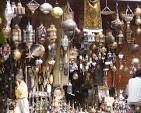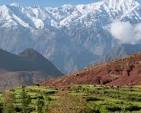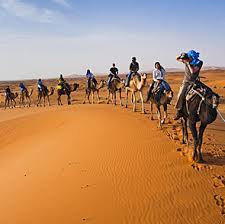The Vibrant Tapestry of Moroccan Culture
Morocco, a land where ancient traditions blend seamlessly with modern influences, offers a cultural experience like no other. From the bustling medinas to the tranquil riads, every corner of this North African country is infused with a rich tapestry of history, art, and customs.
Art and Architecture
One of the most striking aspects of Moroccan culture is its exquisite art and architecture. Intricate tile work, colourful mosaics, and ornate carvings adorn mosques, palaces, and homes throughout the country. The famous blue city of Chefchaouen with its charming blue-washed buildings is a testament to Morocco’s artistic flair.
Cuisine and Hospitality
Moroccan cuisine is a tantalising fusion of flavours from Arab, Berber, and Mediterranean traditions. The iconic tagines, couscous dishes, and mint tea are not just meals but reflections of the country’s diverse heritage. Moroccan hospitality is legendary—guests are welcomed with warmth and generosity, making every meal a shared celebration.
Music and Dance
The sounds of traditional Moroccan music fill the air during festivals and celebrations. From the hypnotic rhythms of Gnawa music to the lively beats of Berber folk songs, music is an integral part of Moroccan culture. The graceful movements of belly dancers and energetic performances by groups like Jajouka add to the vibrant dance scene in Morocco.
Festivals and Traditions
Morocco’s calendar is dotted with colourful festivals that showcase its diverse cultural heritage. The Fes Festival of World Sacred Music brings together artists from around the globe to celebrate unity through music. The Rose Festival in El Kelaa M’Gouna honours the beauty of Morocco’s roses with parades and festivities that captivate visitors.
Handicrafts and Souks
The souks (markets) in cities like Marrakech and Fez are treasure troves of handmade crafts that reflect Morocco’s artisanal traditions. From intricate carpets to delicate pottery, each item tells a story passed down through generations. Visitors can watch skilled craftsmen at work in souks or visit cooperatives that support local artisans.
Conclusion
Exploring Moroccan culture is like embarking on a sensory journey filled with vibrant colours, tantalising tastes, melodious sounds, and heartfelt hospitality. Whether you wander through ancient medinas or sip sweet mint tea in a traditional riad courtyard, Morocco’s culture will enchant you at every turn.
Embracing Moroccan Culture: 7 Essential Tips for Visitors
- When visiting Morocco, it is important to respect the local customs and traditions.
- Morocco is known for its diverse cuisine, so be sure to try traditional dishes like tagine and couscous.
- The Moroccan people are known for their hospitality, so be prepared for warm welcomes and generous gestures.
- It is customary to haggle when shopping in the markets (souks) of Morocco, so don’t be afraid to negotiate prices.
- Traditional clothing like djellabas and kaftans are commonly worn in Morocco, especially during special occasions or religious festivals.
- Morocco has a rich history and architecture, with many beautiful mosques, palaces, and historical sites to explore.
- Learning a few basic phrases in Arabic or Berber can go a long way in showing respect for the local culture and connecting with the people.
When visiting Morocco, it is important to respect the local customs and traditions.
When visiting Morocco, it is crucial to show respect for the local customs and traditions. Understanding and honouring the cultural practices of Morocco not only enriches your travel experience but also fosters positive interactions with the local communities. From dressing modestly in religious sites to greeting others with a friendly “Salaam Alaikum,” embracing these customs demonstrates appreciation for the country’s heritage and values. By immersing yourself in Moroccan traditions, you not only show respect but also open doors to authentic connections and memorable experiences during your journey.
Morocco is known for its diverse cuisine, so be sure to try traditional dishes like tagine and couscous.
Morocco is renowned for its diverse cuisine, offering a tantalising array of flavours and aromas that reflect the country’s rich cultural heritage. When exploring Moroccan culture, it is essential to indulge in traditional dishes such as tagine and couscous. Tagine, a slow-cooked stew bursting with spices and tender meat or vegetables, is a culinary delight that captures the essence of Moroccan cooking. Similarly, couscous, a staple dish made from steamed semolina grains served with savoury toppings like vegetables, meat, or dried fruits, showcases the intricate blend of flavours that define Moroccan gastronomy. Embracing these iconic dishes is not just about satisfying your taste buds but also about immersing yourself in the vibrant culinary traditions that make Morocco a food lover’s paradise.
The Moroccan people are known for their hospitality, so be prepared for warm welcomes and generous gestures.
When immersing yourself in Moroccan culture, be prepared to be embraced by the renowned hospitality of the Moroccan people. Expect to be greeted with warm smiles, sincere welcomes, and generous gestures that reflect the genuine kindness and openness that are ingrained in the country’s cultural fabric. Embracing these heartfelt interactions will not only enrich your experience but also leave you with lasting memories of the warmth and hospitality that define Morocco’s vibrant culture.
It is customary to haggle when shopping in the markets (souks) of Morocco, so don’t be afraid to negotiate prices.
When immersing yourself in the vibrant markets, known as souks, of Morocco, it is essential to embrace the local custom of haggling. Negotiating prices is not only expected but also adds to the lively atmosphere of the market experience. So, don’t hesitate to engage in friendly bargaining with vendors to secure the best deals and enjoy a true taste of Moroccan culture where every purchase is an opportunity for a spirited exchange.
Traditional clothing like djellabas and kaftans are commonly worn in Morocco, especially during special occasions or religious festivals.
Traditional clothing plays a significant role in Moroccan culture, with garments like djellabas and kaftans being prominent features in everyday attire, particularly during special events and religious festivities. These intricately designed garments not only reflect the country’s rich heritage but also showcase the craftsmanship and artistry of Moroccan textiles. Wearing traditional clothing is not just a fashion choice in Morocco; it is a way to honour tradition, celebrate cultural identity, and express respect for important occasions.
Morocco has a rich history and architecture, with many beautiful mosques, palaces, and historical sites to explore.
Morocco’s cultural tapestry is woven with a rich history and architectural marvels waiting to be discovered. The country boasts a wealth of stunning mosques, opulent palaces, and intriguing historical sites that offer a glimpse into its past glory. From the intricate tile work of the Hassan II Mosque in Casablanca to the majestic beauty of the Bahia Palace in Marrakech, Morocco’s architectural heritage reflects a blend of Arab, Berber, and European influences. Exploring these iconic landmarks is not just a journey through time but also an immersive experience in the beauty and grandeur of Moroccan culture.
Learning a few basic phrases in Arabic or Berber can go a long way in showing respect for the local culture and connecting with the people.
Learning a few basic phrases in Arabic or Berber can significantly enhance your cultural experience in Morocco. By making the effort to speak the local language, you not only show respect for the traditions and customs of the country but also create meaningful connections with the people you meet. Whether it’s a simple greeting or a polite expression, mastering these fundamental phrases can open doors to authentic interactions and a deeper appreciation of Moroccan culture.




